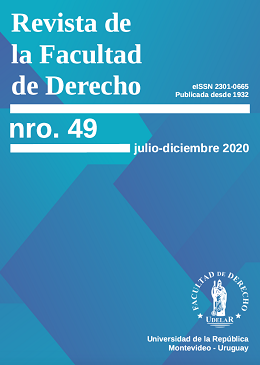The Fiscal Rules and Uruguayan Constitution
Abstract
“Fiscal rules” is the denomination of a set of stable juridical norms, containing limitations to the public debt or -more frequently- the public spending. After describing the usual features of the fiscal rules, the first issue is the analysis of the possibility to sustain the Uruguayan constitution contains some kind of such rules. The conclusion is that there is a prohibition -although diffuse- of deficits at a the level of local governments (departamentos), but there is no limitation to the public spending at the level of national government. Secondly, a fiscal rule on public spending could not be passed out of a budgetlaw, excepting such of only programmatic content, which shall be ineffective respecting the budget law. A fiscal rule could be included in a budget law, but it could be suppressed or modified in any moment by other budget law. However, the creation of a technical -or any other kind- body having the power to determinate, directly or indirectly, the public spending, would be unconstitutional.
Downloads
References
Aarnio, A. (2000). Derecho, racionalidad y comunicación social. Ensayos sobre Filosofía del Derecho. Fontamara.
Barquin, J., y Zufriategui, M. P. (2028). Uruguay y la regla fiscal. Un cambio de rumbo necesario. Academia Nacional de Economía. http://www.acadeco.com. uy/files/2018_premio1_barquin_zufriategui.pdf
Barro, R. (1981). Output effects of government purchases. Journal of Political Economy, 89(6). The University of Chicago Press.
Bin, D. (2015). Fiscal superstructure and the deepening of labor exploitation. Capital and Class, 39(2).
Blanco, A. (2007). Derecho, teoría del derecho y dogmática jurídica. Contribución desde el caso especial de la responsabilidad de los directores y socios en los impuestos a las rentas uruguayos. En A. Ferrer Montenegro y G. Caffera (Coord.). Responsabilidad de administradores y socios de sociedades comerciales. FCU.
Blanco, A. (2016). Programas políticos, construcción del discurso jurídico y control de constitucionalidad. Ruptura, (7).
Blanco, A. (2019). Estudios críticos sobre finanzas públicas y derecho tributario. FCU.
Brennan, G., y Eusepi, G. (2004). Fiscal constitutionalism. In J. Bockhaus and R. Wagner (Ed.). Handbook of public finance. Kluwer.
Bougrine, H., y Seccareccia, M. (2002). Money, Taxes and Public Spending, and the State, within a Circuitist Perspective. Journal of Political Economy, (32), 3.
Cohen, J. (1999). Democracy as Liberty. In J. Elster (Ed.) Deliberative Democracy. Cambridge University Press.
Correa, J., Ferrada, C. Gutiérrez, P., y Parro, F. (2014). Effects of fiscal policy on private consumption: evidence from structural-balance rule deviations. Applied Economic Letters, 21 (11).
Gavin, M., y Perotti, R. (1997). Fiscal policy in Latin America. National Bureau of Economic Research (NBER) Annual, 12. MIT.
Giavazzi, F., y Pagano, M. (1990). Can severe fiscal contractions be expansionary? Tales of two small European countries. National Bureau for Economic Research, Cambridge (Massachusetts). http://www.nber.org/papers/w3372
Haba, E. P. (1995). Sobre el Derecho como “técnica” o “tecnología”. Apostillas a una polémica entre dos visiones cientificistas sobre las posibilidades del discurso jurídico. Doxa, (17-18).
Habermas, J. (1998). Facticidad y validez. Acerca del derecho y el estado democrático de derecho en términos de teoría del discurso. Trotta.
Jiménez de Aréchaga, J. (1947). La Constitución Nacional, (Tomo 7). Organización Tipográfica Medina.
Kelsen, H. (1997). Teoría pura del derecho. Porrúa.
Kennedy, D. (1997). A critique of adjudication. Harvard University Press.
Kopits, G., y Symansky, S. (1998). Fiscal Policy Rules. International Monetary Fund, Washington D.C.
Nino, C. S. (1989). El constructivismo ético. Centro de Estudios Constitucionales.
Parguez, A. (2002). A Monetary Theory of Public Finance. The New Fiscal Orthodoxy: from Plummenting Deficits to Planned Fiscal Surpluses. International Journal of Political Economy, 32(3).
Sarlo, O. (2006). El marco teórico en la investigación dogmática. En AA.VV. Observar la ley. Ensayos sobre metodología de la investigación jurídica (Ed. Christian Courtis). Trotta.
Vernengo, R. (1986). Ciencia jurídica o técnica política. ¿Es posible una ciencia del Derecho? Doxa, (3).
Vidal, M. (2015). La gestión financiera del Estado. FCU.
Wicksell, K. (1994). A new principle of just taxation. En R. Musgrave and A. Peacock (Ed.). Classics in Theory ofPublic Finance. Saint Martin’s Press.
Wyplosz, C. (2012). Fiscal Rules: Theoretical Issues and Historical Experiences. NBER Working Paper Series, National Bureau of Economic Research (NBER). https: //www.nber.org/papers/w17884
Copyright (c) 2020 Andrés Blanco

This work is licensed under a Creative Commons Attribution 4.0 International License.
This journal provides open access to its content, based on the principle that providing the public with free access to research helps a greater global exchange of knowledge
Revista de la Facultad de Derecho. Creative Commons Reconocimiento 4.0 Internacional License.










